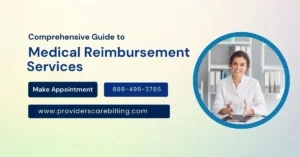The insurance reimbursements, billing, and credentialing regulations have been modified for the counseling practices in Massachusetts, such as LMFTs and LPCs (Licensed Professional Counselors). Such transformations may impact your bottom line, workflow, and payer relationships.
Providers Care Billing LLC can assist in navigating the new insurance billing rules, pointing out some of the key codes, including 90791, H0031, and H2011; revising mid-level provider billing guidelines; and staying ahead of the changes to ensure your mental health billing, therapy billing, LPC insurance credentialing and revenue cycle is robust, regardless of the fact that you are a Massachusetts-based LMFT or LPC.
The Big Shift: Why now are LMFTs and LPCs?
In the past, psychiatrists, psychologists, and social workers were given the privilege of reimbursement by many insurance plans, particularly Medicare. LMFTs and licensed mental health professionals were regularly under network or were forced to cash in or negotiate an indirect billing setup. The state of behavioral health in Massachusetts was dynamic and multi-payer (commercial insurance, MassHealth Medicaid, Medicare, and employer plans), which made the scaling of in-network LMFTs and LPCs a challenge.
In the case of LPCs, the question this change might bring up is: Will LPCs automatically become enrolled? Do they meet the criteria? What impact does this have on Massachusetts payers (MassHealth, commercial)? The importance of this: the insurance reimbursement streams are opened to allow practices, therapy billing to older adults or Medicare populations can be done, and mid-level provider billing guidelines need to be revised, and the credentialing and revenue cycle management is more complex but more open.
Massachusetts‑Specific Considerations
1. LMFTs Enrolling in Medicare in Massachusetts
To serve Medicare beneficiaries in Massachusetts, you now need to:
- Licensed or Certified LMFT in Massachusetts (state law).
- A master’s or doctoral degree that qualifies one to be licensed under Massachusetts law.
- Have completed at least 2 years or 3000 hours of post-master supervised clinical experience as an MFT.
- Sign up through the PECOS system (or paper CMS-855I) to be a Medicare provider.
The effective billing date may not be earlier than January 1, 2024, upon enrolment. The Medicare Physician Fee Schedule will provide LMFTs and MHCs with 75 percent of what clinical psychologists receive under their respective schedules for similar services. For official Medicare rules, see CMS.gov.
2. The status of LPCs in Massachusetts: The Situation
Although the federal rule does not directly mention LPCs, it refers to MFTs and mental-health counselors (MHCs). This is regarded as an indicator by many Massachusetts LPCs; however, it must be confirmed with the CMS and their Medicare Administrative Contractor (MAC) to determine whether their license qualifies as a mental health counselor or an equivalent. Other states may have an entirely different approach towards LPCs than towards LMHCs or MHCs, and, therefore, Medicare enrollment of LPCs should be carefully checked.
3. Insurance Reimbursement and MassHealth (Medicaid)
The stakeholders who embrace MassHealth (Massachusetts Medicaid) should be aware of the billing and reimbursement policy. MassHealth enrolls and licenses providers and pays for mental-health counseling. When you provide marriage counseling that is accepted by Medicaid, make sure that your license is accepted according to MassHealth and that the services (e.g., couples therapy, family counseling) should be covered and reimbursable according to the MassHealth fee schedule.
Commercial payers in Massachusetts tend to model their Medicaid or Medicare credentialing and claim guidelines after them, and thus, federal Medicare reform percolates through the payer ecosystem.
Major Billing Codes/guidelines that all LMFT/LPCs have to be aware of
The following are essential codes and billing standards you should incorporate in the mental health billing workflow and therapy billing workflow:
- Billing Guidelines CMS 90791 is the CPT code (90791) (Psychiatric Diagnostic Evaluation) that is normally utilized in initial intake or evaluation in therapy areas. Apply the code to individual, couples, or family sessions. Your payer network accepts the code, and in the case of Medicare billing, make sure you are enrolled and that you are providing your NPI and valid taxonomy (e.g, MFT).
- H0031 Billing Guidelines-HCPCS code H0031 (Mental health assessment, by non-physician) is a commonly used behavioral health billing code. Providing assessments with counseling insurance or Medicaid/commercial plans? Learn the eligibility and reimbursement regulations of H0031 in a specific state.
- H2O11 Billing Guidelines H2O11 H2O11 (Crisis intervention service, per 15 minutes) billing is applied to short-term crisis counseling. In some cases, Medicaid and commercial plans covering crisis services are provided in Massachusetts, so your H2O11 access should clarify when it is permitted, whether or not there should be modifiers, documentation required, and any payer-specific regulations.
- Mid-Level Provider Billing Rules – LMFTs and LPCs are gaining the ability to enroll in Medicare, thus knowing the mid-level provider regulations. These include direct billing (not incident to), supervision, credentialing, NPI taxonomy, place of service, modifiers, and telehealth eligibility.
- Therapy Bills: Couples and Family Therapy: Family therapists who bill the Medicare system with 90847 (Family psychotherapy, with patient present) or those who bill the Medicare system using in-service couple therapy codes should ask the following question: Does Medicare cover marriage counseling? Does this include family counseling? Based on the new law, Medicare will cover, provided that the provider is enrolled, the service is dealing with mental illness, and other conditions of coverage. Individual network contracts and coverage policies of couples or of marriage counseling may exist between commercial insurers and state Medicaid plans such as MassHealth.
Live Case Study: The Change Navigation of One Massachusetts Practice
Introducing you to “Beacon Family Wellness,” a midsize practice in the suburb of Boston, LMFT/LPC. Prior to 2024, they took commercial insurance and MassHealth, but were not able to directly bill Medicare for couples therapy led by an LMFT. Elderly (aged 65 and above) tended to pay in cash or out of the network. The owner, who is a licensed LMFT, saw an opportunity when the Medicare change became effective on January 1, 2024. They contracted a mental-health billing firm, refined their credentialing process, joined Medicare, and re-trained billing personnel on important codes (90791, 90847, 90834, H2011).
In half a year, they started taking Medicare when it comes to diagnostic assessment and family therapy. They stated that the insurance reimbursement revenue increased by 12 per cent, in part because of the older adult group, and the stricter internal workflow processes related to documentation and credentialing. What they learned: The owner says that in their thought process, they viewed the change as a business opportunity rather than a regulatory headache.
What You Have to Do (Action Plan)
The specific methods of adaptation of LMFTs and LPCs in Massachusetts to the new rules are as follows:
- Confirm that you are licensed and credentialed: As an LMFT, make sure that you meet the federal criteria to be enrolled in Medicare.
- Make sure that your NPI and taxonomy are current. Make sure your NPPES account has the appropriate licence and an active NPI number.
- Register in Medicare (when you are eligible): In the case of LMFTs, it is to enroll via PECOS or CMS-855I and await your effective date (January 1, 2024, or later).
- Credential with commercial payers and MassHealth: Documents Credential and educates the payer about your LMFT/LPC status so that your reimbursement and billing lines reflect the appropriate type of practitioner.
- Audit your therapy billing codes: Look at the use of 90791, H0031, H2011, 90847, 90834, etc, and verify that documentation, modifiers, and billing flows are in line with recommendations.
- Train: The therapy billing will minimize time and error detection, increase reimbursement, and prevent claim denials through engaging the billing team or outsourcing to a specialty medical billing firm.
- Supervise payer agreements and reimbursement rates: e.g., LMFTs who bill Medicare will be paid 75% of what the psychologist will be paid. There is a wide range of commercial reimbursement.
- Contact clients and referral sources: Go on record with your community about you now accepting Medicare, MassHealth, or other insurance panels- this can create new referrals and create your lead generation pipeline.
Conclusion
The new insurance billing regulations in Massachusetts alter the way in which LMFTs and LPCs carry out billing, credentialing, and reimbursement. Beginning in 2024, CMS will allow LMFTs and mental health counselors to use Medicare, so providers will be able to provide a greater range of services, such as couples and family therapy. The article discusses the new billing codes, the MassHealth provisions, the mid-level provider regulations, and the actions needed by the practices to remain compliant in increasing revenue and reducing claim denials.
When you are ready to take the change, simplify your billing, deal with the new regulations, and maximize revenue, call Providers Care Billing LLC.
📞 Call Now: 888-495-3786
📧 Email: Info@providerscarebilling.com
FAQs
Does marriage counseling receive Medicare reimbursement?
Yes, with the new rule, LMFTs (and qualified mental health counselors) are able to bill Medicare to diagnose and treat mental illness, couples therapy, and family therapy when they are enrolled as such.
Does Medicare pay for family counseling?
Yes – under Medicare Part B, services provided by an eligible LMFT/MHC in the diagnosis/treatment of mental illness are reimbursed, as long as all enrollment and scope provisions are satisfied.
What are the mid-level provider billing rules that I have to be aware of?
These are: individual enrollment (not incident-to another practitioner), use of appropriate taxonomy/NPI, location/setting rule, telehealth modifiers, and supervision rule to an associate therapist. See incident-to vs supervisory billing advice.
What is the meaning of the codes such as 90791, H0031, and H2011 in my practice?
- The code for the intake/diagnostic evaluation of therapists is 90791.
- H0031 is a mental health assessment code that is non-physicians (commonly in community behavioral health).
- The consumption of H2O11 is applied to crisis intervention every 15 minutes.





